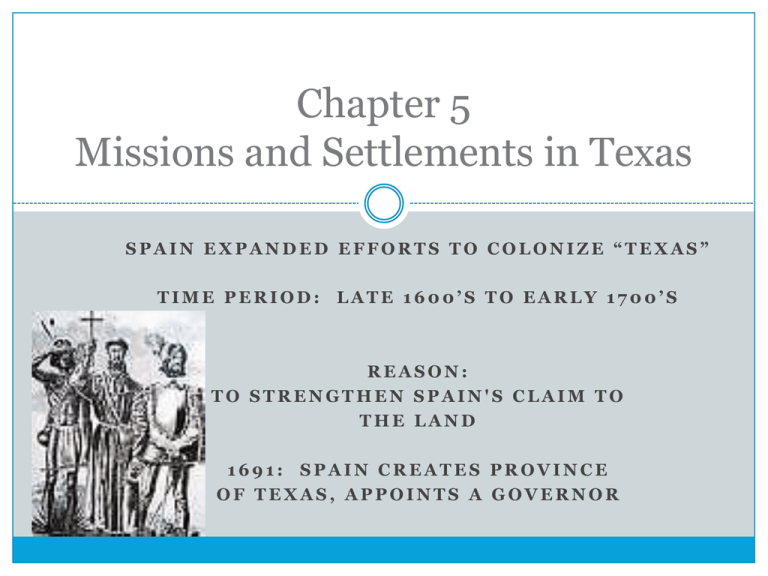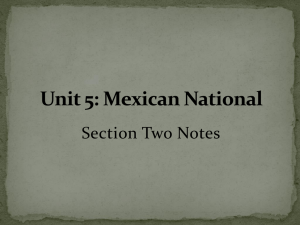Chapter_5_Missions_Powerpoint
advertisement

Chapter 5 Missions and Settlements in Texas SPAIN EXPANDED EFFORTS TO COLONIZE “TEXAS” TIME PERIOD: LATE 1600’S TO EARLY 1700’S REASON: TO STRENGTHEN SPAIN'S CLAIM TO THE LAND 1691: SPAIN CREATES PROVINCE OF TEXAS, APPOINTS A GOVERNOR Missions in Texas Why missions? 1. to convert Natives to Christian faith 2. to change Native culture to Spanish ways 3. to provide Native workers to grow crops, build shelters and provide labor 4. to subdue Natives and prevent hostile attacks West Texas First Mission in Texas 1682: Corpus Christi de la Ysleta (Body of Christ of Ysleta) Near El Paso Spain had settlement in New Mexico: Santa Fe 1609 Close to other missions No French Threat yet! French claims to land France claimed all the land drained by the Mississippi River France focused on the fur trade French trappers and traders lived in the land that is now the state of Louisiana, and worked with the Caddo in East Texas La Salle’s settlement called Fort St. Louis: weak claim French Territory Louisiana Map from Lewis and Clark Expedition Later Map of Louisiana Purchase A. Spain learned of La Salle & Fort St. Louis 1. Alonso de Leon expedition to destroy fort 2. Find no one alive at fort on April 22, 1689 3. Fort in ruins 4. De Leon travelled deeper into East Texas from there with Angelina, a Native guide and interpreter B. Spanish meet Hasinai They called them the “Tejas Indians” meaning friend 2. Hasanai: tribe of the Caddo 3. Father Damian Massanet, Catholic Church official who was on the De Leon expedition promised to return to the Tejas. 1. C. First East Texas Mission 1. Father Massanet got permission from the Viceroy to return and found a mission among the Tejas. 2. 1690: Father Massanet, 4 friars and 100 soldiers; was left to Father Francisco Hidalgo 3. Crude log buildings made up the Mission San Francisco de los Texas San Francisco de los Tejas Location not far from Caddo Mounds--- near Alto and Weches Replica of original mission in historical park today. Area in brown is location of the East Texas Missions Roads to East Texas Roads Most well known road:) El Camino Real, (The King’s Highway: highway markers today call it the Old San Antonio Road. Highway 19 to College Station: OSR El Camino Real de los Tejas: road to San Francisco de los Tejas First Tejas Mission Failed 1. Drought ruined crops 2. Disease killed many Indians and one friar 3. Tejas rejected Catholic religion 4. Tejas resented Spanish attempts to change their way of life. D. Spanish settlements along Rio Grande River 1. Mission San Juan Bautista (St. John the Baptist) built on west side of Rio Grande in 1699. 2. Known as the “Gateway to Texas” and the “Mother of Texas Missions” 3. Located at crossroads, grew into 3 missions, a presidio and a town. Mission located near present-day Eagle Pass Father Francisco Hidalgo Spanish missionary had been at San Francisco de los Tejas. (Failed E. TX. Mission) Wanted to return to the Hasanai. Viceroy ignored his requests. Devised a plan. E. France Threatens Again 1. French traders in the Gulf Coast area wanted to trade with Spanish merchants. 2. Spanish law prohibited foreigners from trading with the colonies in New Spain. (Why?) 3. French had no interest in taking territory or converting the Indians E. France Threatens Again 4. Francisco Hidalgo asked French to set up a mission in East Texas 5. French governor appointed Louis de St. Denis (Denee) to negotiate about this with Spanish officials on the Rio Grande. 5. Sets up a trading post named Natchitoches on the Red River in present-day Louisiana. 6. Captain Diego Ramon was alarmed when the French St. Denis arrived at Mission San Juan Bautista (on the Rio Grande). Why? 7. Ramon arrested St. Denis and sent him to Mexico City to be examined by viceroy to check his motives. Viceroy thinks French are a Threat! Although St. Denis insisted France did not want to occupy East Texas, Spanish officials did not believe him. Viceroy ordered new Spanish missions to be built in East Texas along with soldiers to protect them. Bust of St. Denis Ironically, St. Denis was sent to guide the Spanish into East Texas, and was allowed to marry Ramon’s step-granddaughter!!! St. Denis himself must have been very likeable! F. Many attempts to colonize 1700 - 1750. 1. 1716: Spanish came back to San Francisco de los Tejas with soldiers and Spanish families. (St. Francis of the Tejas) and built 6 missions in E. TX 2. Nuestra Senora de los Dolores de los Tejas – presidio to protect the mission STOP G. San Antonio is Founded 1. Spanish needed a midway settlement from the Rio Grande settlements to the East Texas missions. 2. Site on San Antonio River chosen: 1718 3. Known as San Antonio de Bexar---today, San Antonio is in Bexar County---the name is used today! San Antonio de Bexar: Location Location of San Antonio Map of all Texas Missions San Antonio Missions: most missions in one location Design of Spanish missions Coahuiltecan Indians adapted well to mission life. Why? San Antonio was a series of missions along river. Missions provided a church for the people. The church was the focal point of community life. The structure was prominent within the compound. The convento, or living quarters of the missionaries and several lay assistants, was in close proximity to the church building. The cemetery, well used as the result of European diseases, lay adjacent. Daily life was centered around the church with its summons to worship and prayer, the fields, the workshops, and the classrooms. Conversion was encouraged when living in the missions, and required in order to become Spanish citizens. Presidio San Antonio de Bexar Fort: housed the soldiers 1718, built by Martin de Alarcon Soldiers brought their families and settled permanently. Why was this presidio a good idea? What threats do you think the Spanish faced? San Antonio de Bexar Building plans of the Fort H. San Antonio de Valero 1. San Antonio de Valero was a mission. 2. Built in 1718. 3. The mission church became known as the Alamo, and was the site of the fateful battle of the Texas Revolution. San Antonio Today M I S S I O N T R A I L SAN ANTONIO RIVER: RIVER WALK War of Quadruple Alliance The War of the Quadruple Alliance (1718–1720) was a result of the ambitions of King Philip V of Spain to retake territories in Italy and to claim the French throne. It saw the defeat of Spain by an alliance of Britain, France, Austria (then a State of the Holy Roman Empire), and the Dutch Republic. I. The Chicken War 1719 1. French attacked Mission San Miguel de Linares de los Adaes 2. Captured a Spanish soldier and looted hen house 3. Hens spooked horse and Frenchman fell; Spanish soldier escaped 4.The result: Viceroy sends Aguayo and 500 soldiers to reestablish abandoned missions and moved Presidio Nuestra Senora de la Dolores further east, closer to the French. J. Los Adaes Los Adaes: Gov. Aguayo built a large presidio, Nuestra Senora del Pilar de los Adaes, near Natchitoches 1. Built with Franciscan Priest, Antonio Margil de Jesus 2. 100 soldiers and their families started a village near the fort. 3. French did not like it, but did not protest or attack. Los Adaes Location of Spanish fort Louisiana Marker today Los Adaes Diagram of the fort Diagram of Historic Park K. La Bahia 1722 1. Presidio established on top of Ft. St. Louis by Domingo Ramon in 1721 2. Also founded a mission across a creek by Governor Aguayo 3. Was moved inland to present day Goliad by Jose de Escandon in 1749 La Bahia: 2nd fort Aguayo built Aguayo moves on to site of Fort St. Louis: design of original fort Builds a presidio on the site named La Bahia-later moved and this is the 2nd one. La Bahia moved from Fort St. Louis site to present day Goliad due to Karankawa problems La Bahia in the distance Chapel at La Bahia near Goliad today. Presidio La Bahia Spanish Cannon Barrel Location of Goliad, Texas Plains Indians Resent Missions Intruders on their hunting grounds Priest and Friars try to convert them anyway! Apaches raided San 1748-1751: 3 missions Antonio de Bexar often. Comanche fought fiercely, valued captured horses! founded along San Gabriel River in Central Texas, near present day Rockdale to serve Tonkawa. Failed: Apache raids, smallpox, drought, Tonkawas left 1757: San Saba Mission—bold step Far from nearest San Antonio Wanted to convert Apache, who wanted protection from the Comanche. Apache didn’t take to mission life. Comanches attacked, moved mission to Nueces River. Ruins of San Saba Mission Missions unsuccessful with Plains Indian Spanish problems: Plains people too fiercely 1. Remote location made independent to settle down to mission ways. Remember: Plains Indians hunted the buffalo and were nomadic! it hard to supply and administer the missions.











